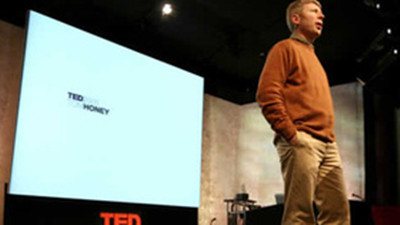He wrote, "If some religious genius did come up with an explanation of exactly why all these deaths made sense,would we feel happier, or safer, or more confident in God?"
他寫道:“如果真有宗教天才能夠解釋通為什么這些死亡是合理的,難道我們會感到更幸福、更安全或對上帝更有信心嗎?”
If the man in the photograph that appeared in the newspapers,holding the hand of his dead child was standing in front of us now,there are no words that we could say to him.
如果報紙上刊登的照片里面的人,握著他死去孩子的手,現在站在我們面前的話,我們將無言以對,
A verbal response would not be appropriate.
說任何話都不恰當。
The only appropriate response would be a compassionate silence and some kind of practical help.
唯一恰當的是滿懷同情地沉默和實際的援助。
It isn't a time for explanation, or preaching, or theology;it's a time for tears.
這種時候不是解釋、布道或講神學的時候,這種時候是流淚的時候。
This is true. And yet here we are, my church in Oxford,semi-detached from events that happened a long way away,but with our faith bruised.
的確是的。正因如此,我們今天來到這里,這個在牛津的教會,雖然離海嘯發生地有萬里之遙,但是我們對上帝的信心受到打擊。
And we want an explanation from God.
我們希望上帝給一個解釋,
We demand an explanation from God.
我們強烈要求上帝給一個解釋。
Some have concluded that we can only believe in a God who shares our pain.
有人認為,我們只能相信上帝是能分擔我們痛苦的。
In some way, God must feel the anguish, and grief,and physical pain that we feel.
通過某種方式,上帝一定感受到了我們所感受的痛苦、悲傷和肉體的痛楚。
In some way the eternal God must be able to enter into the souls of human beings and experience the torment within.
通過某種方式,永恒的上帝一定能夠進入人的靈魂,體驗人內心深處所經受的折磨。
And if this is true, it must also be that God knows the joy and exaltation of the human spirit, as well.
如果這是真的,那么上帝也必定知道人類精神上的喜悅和興奮。
We want a God who can weep with those who weep,and rejoice with those who rejoice.
我們需要上帝可以與哭泣的人一同哭泣,與高興的人一同高興。
This seems to me both a deeply moving and a convincing re-statement of Christian belief about God.
我覺得這篇文章是一個既感人至深又有說服力的基督徒對上帝信仰的與過去有點不同的聲明。
For hundreds of years, the prevailing orthodoxy, the accepted truth,was that God the Father, the Creator, is unchanging and therefore by definition cannot feel pain or sadness.
數百年來,盛行的正統和公認的真理是:作為天父和造物主,上帝是永恒不變的,因此根據定義,上帝是感覺不到痛苦或悲傷的。
Now the unchanging God feels a bit cold and indifferent to me.
現在,我感到這個永恒不變的上帝有點冷漠無情。
And the devastating events of the 20th century have forced people to question the cold, unfeeling God.
20世紀所發生的一系列毀滅性事件迫使人們對這個冷酷無情的上帝產生懷疑。

The slaughter of millions in the trenches and in the death camps have caused people to ask, "Where is God in all this?
在戰壕和死亡集中營里數以百萬計的屠殺,促使人們追問,那個時候上帝到哪里去了?
Who is God in all this?"
那些時候誰是上帝?
And the answer was, "God is in this with us,or God doesn't deserve our allegiance anymore."
回答是:“要不上帝與我們同在,要不上帝已不值得我們信仰了。”
If God is a bystander, observing but not involved,then God may well exist, but we don't want to know about Him.
如果上帝是一個旁觀者,觀察但不參與,那么上帝可能仍然存在,但我們不想了解他。
Many Jews and Christians now feel like this, I know.
我知道許多猶太人和基督徒現在就是這樣認為的,
And I am among them.
我是其中一員。
So we have a suffering God-a God who is intimately connected with this world and with every living soul.
因此,我們有一個受苦受難的上帝,一個與這個世界,與每一個活生生的靈魂緊密相連的上帝。
I very much relate to this idea of God.
我很贊同這個關于上帝的看法。
But it isn't enough. I need to ask some more questions,and I hope they are questions that you will want to ask, as well,some of you.
但這還不夠。我需要再問一些問題,希望這也是你們想問的問題。
Over the last few weeks I have been struck by the number of times that words in our worship have felt a bit inappropriate, a bit dodgy.
最近幾個星期以來,我很多次被我們做禮拜所用的不恰當的和有點虛假的話所困擾。
We have a pram service on Tuesday mornings for mums and their pre-school children.
我們在星期二上午有一個對媽媽和學齡前兒童的托兒服務。











